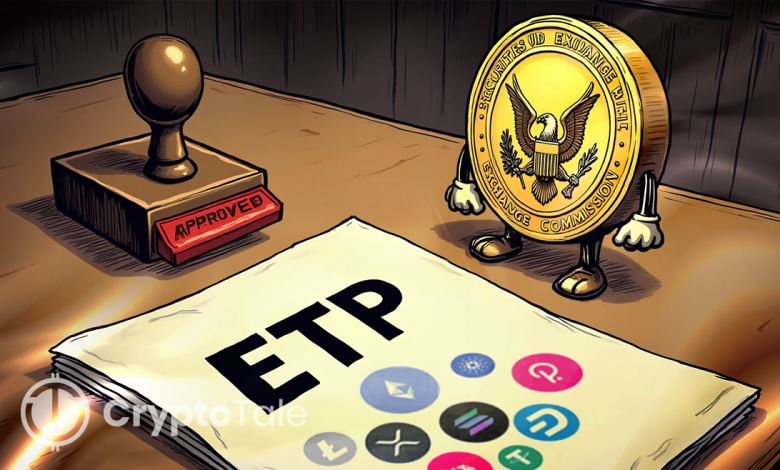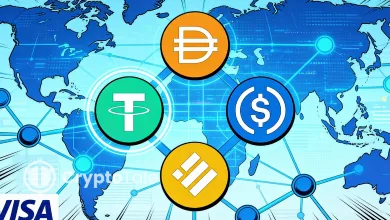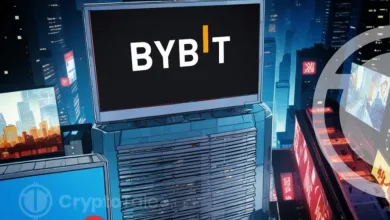SEC Unveils Crypto ETP Listing Standards, Paving Way for Altcoin ETFs

- The SEC has introduced new ETP listing rules, setting a framework for crypto asset ETFs.
- These listing standards could soon enable regulated altcoin ETFs beyond just Bitcoin and ETH.
- Clear SEC guidelines may boost investor confidence and drive institutional crypto adoption.
The U.S. Securities and Exchange Commission (SEC) has introduced new listing standards for crypto exchange-traded products (ETPs). These changes may fast-track approval for altcoin ETFs as early as September. The key requirement is six months of futures trading on Coinbase’s derivatives exchange. This benchmark allows several large-cap tokens to qualify. Solana (SOL) and XRP appear to be first in line.
The Chicago Board Options Exchange (Cboe) filed the proposal that triggered the new SEC response. The change creates a unified set of rules for listing crypto funds. Previously, each fund needed individual review under the SEC’s 19b-4 form process. That approach slowed approvals and created uncertainty. The new framework could eliminate that delay.
ETF specialist Nate Geraci described the SEC proposal as “very important.” If adopted, issuers would only need to meet general standards. That would allow issuers to launch ETFs without separate applications for each asset.
Solana and XRP ETFs May Arrive by October
Solana ETPs have a decision deadline of October 10. If the rule is finalized soon, Solana could meet the standards this fall. XRP ETPs may follow close behind. XRP futures launched after Solana’s, so its timeline is slightly later. Still, both could debut in early Q4. Lawyer Greg Xethalis noted that Solana would likely include staking features. In-kind redemption models would also apply.
The SEC now permits in-kind creation and redemption of crypto ETP shares. That structure allows for direct exchanges of tokens for shares. It operates similarly to traditional ETFs and minimizes the level of cash dependence. This model could help cut costs and attract institutional participation. It also aligns with recent White House calls for clearer crypto integration.
A new 168-page policy paper from the Trump administration’s Digital Asset Working Group supported those aims. The report pushed for streamlined rules and fewer delays. Meanwhile, the GENIUS Act, signed into law this month, established new frameworks for stablecoins. Together, these moves show coordinated efforts to modernize crypto oversight.
NYSE Arca and Cboe Lead Regulatory Push
NYSE Arca, another major exchange, filed similar rule change requests. This suggests broad industry support for simplifying ETF approvals. At present, each crypto ETF application triggers a complex SEC review process. The new rule change could reduce friction by making approvals more automatic.
Fewer delays would mean faster launches and more investor access. It might also boost the trading volume, as well as liquidity, as evidenced by previously Bitcoin and Ethereum ETPs. As of late July, Bitcoin is trading at $118,300 at press time. It held more than 60% of the market dominance with a gain of 21% within 90 days.
Related: SEC Approves In-Kind Crypto ETFs for Bitcoin and Ether
Rising prices and demand make conditions favorable for broader product adoption. BlackRock has already filed to stake Ethereum in its own ETP structure. While the SEC paused some applications, like those involving XRP, it now appears more flexible. Officials stress the need to support innovation while protecting markets.
Analysts believe the rule change could support a long-awaited wave of altcoin ETFs. Institutional demand has grown since spot Bitcoin and Ethereum ETPs gained traction. The SEC’s evolving approach may help bridge crypto and traditional finance. Clearer rules make it easier for institutions to enter the market.
Final approval of the listing standards could come within 60 days. If that happens, the market could see new ETFs by early October. This change could reshape how U.S. investors access crypto. For altcoins, it could be the start of mainstream financial inclusion.




